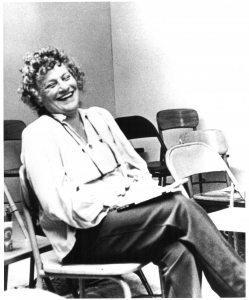This comes from writer / performer Eva Moon.
Improv as a Tool for Writers By Eva Moon
One of the pleasures of writing fiction is falling in love with the characters you create – and then torturing the hell out of them. Bringing them to life and uncovering all the ways they might react to the tortures you devise is arguably the most important thing to nail — the most fascinating story won’t interest your readers if they don’t care about your protagonist — but it may also be the most challenging.
In my current project, three characters are locked in a complex triangle of shifting power. To explore their possible dynamics, I hit on a strategy that was not only enlightening, but also a lot of fun:
I tapped a local improv troupe and got three of them to agree to play some improv games as my characters in exchange for dinner.
Each player chose one character and was given a thumbnail biography, two core personality traits and an overview of the central problem and setting of my story. I turned primarily to the games of Viola Spolin, the mother of improvisational theater, because she focuses on direct experience rather than entertaining audiences (though they can be very entertaining!). I learned them from master instructor, Gary Schwartz.
STATUS
One of the things I wanted to explore with my characters was ways they might deal with shifting dominance. The concept of Status in improv was developed by Keith Johnstone. Rather than try to create scenarios that would cause a shift, we played simple two person scenes unrelated to the goal. Each player began with high status behaviors (straight spine, slow movements, maximized bodyspace) or low status behaviors (downward focus, quick movements, minimized bodyspace). When I called “switch” they kept the scene going, but embodied the opposite behaviors. The results were fascinating! Through physical behavior shifts, they stayed true to their roles but managed to turn the tables on each other organically.
SUBTEXT
To focus on how each character might each grapple with an elephant in the room, we played a Spolin game called “What’s Beyond” where the players are preoccupied with something off stage but must not mention it on stage. I gave them a simple activity – playing cards – and each a devastating secret. The resulting card game was filled with tension, emotion and subtle barbs – far more lively and fascinating to watch than an open discussion. And hilarious.
ALLIANCES
For our final game, I wanted to explore shifting alliances in a triangle. By this time, the players were thoroughly into their roles, each bringing the character’s personality and traits to whatever situation arose. I turned to a Spolin game called “Supplication” in which three players take turns each round: A Supplicant pleading for something, an Accuser arguing against and a Judge with the power to decide who wins. The scenes crackled with energy and alliances changed constantly as the judge was swayed one way and then the other by the arguments of the other two.
Even just this one short session opened new insights and possibilities for my characters and has made them much more spirited, opinionated and fractious as I wrestle them onto the page. I recommend giving it a try. Most cities have at least one improv troupe. Aside from your own goals as a writer, it’s great practice for the actors, so they may very well be open to the idea. Especially if there’s food.
Many thanks to East Side Story Improv and Gary Schwartz.

Intriguing! I’d love to have been an observer for these activities. I bet theat helped to develop the motivations and the relationships of the characters. I think it’s great when actors facilitate the writing process; after all, great writing is the bedrock of an actor’s trade, even though improv is a splendid variation.